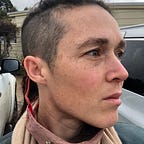The rush weaver’s rebellion
Trigger warning: rape
When was the last time you lost yourself in activity and called it work?
A long, long time ago my mother’s people were rush weavers. It was not their work, but their life to weave rushes, harvesting them from the marshes where the grey heron hunted, learning the ways of frogs and wading birds, water snakes and mud. Knowing, without reason, the complex interplay of earth, water and air. They were marsh dwellers, beautifully embodying the landforms that gave them life. Crafting mats and baskets, bedding and apparel from carefully care-taken fields of rush. There was no difference or distinction between who they were, where they lived, and what they did, it was all one and the same.
But it did not stay that way. Others came to the isle, and seeing the beauty of their mats and baskets, the beauty of their concentration on that singular occupation, became desirous of having it, or if not having it then taking it away. They were coerced into slavery. Not with harsh words or actions, but with silky tongues that promised better lives for their children and better homes for their children’s children. Aspiring them to things they didn’t need and lives they didn’t want. They were put to work. First in people’s homes, then in their bedrooms.
This is a true story, though difficult to verify.
What happens to a woman when her talents become a commodity, separated off from who she is and what gives her life? Before they were not conscious of a division between thought and action, self and other, human and not human. But now it rose up in them like the acid burn of an undigested meal.
Clever hands, it was said. The most skilled baker. The best for washing silks and linens. They have a way with water, an affinity. As if it spoke to them and they to it. As if they shared a language — the language of rushes. So much were they spoken about, talked down to, praised and punished, not for being who they were but for doing what they did, that in the end it became impossible to see themselves as whole. What good are a pair of hands without arms to swing them, without legs to move them from place to place, without a depth of connection to the activity of their motion that allows them to move without conscious thought, knowing what is required before the action is yet begun?
And it wore on them. The way that work wears on us today, so often ending in burnout, or crises that are glossed over as turning points in an otherwise untroubled life. But it wore on them worse because they were as yet unused to the daily grind, as yet unprepared for the severance of self from labour, thought from activity, that the rift seemed an abyss into which they fell and could not climb out.
Then, when their spirits were thus broken, their wild heron’s cry reduced to a croak, their usefulness as domestics was called into question. But their bodies, wherein resided the aching beauty of the marshes, were still coveted, longed for, gloated over, raped and then tossed aside. More beauties could be found that were not so broken.
This is a true story. I dare you to disbelieve.
And so, what was once theirs was taken from them. The timelessness of a life well lived. The beauty of a body that lives and breathes in the undiluted communion of person and place.
And what took it from them? Work. The word implies a separation of person and action; activity requiring conscious thought. Is this something to aspire to? This severance of body and motion? The disconnection of a people and their place?
I was reading Tyson Yunkaporta, who writes that in the language of his adopted people there is no word for work. They are not yet so corrupted by the influence of western civilisation as to need one. I envy them the wholeness of their person, their embodiment of place.
And if, from this envy, I take action. Restoring myself to the ways of old. Becoming a rush weaver, calling it my work when before it was just life, will I again know the marshes like I know the roads leading to my child’s school? Will my throat find the shapes that sound the heron’s bark, like aged wood tearing skin? Will my body remember how to act without undue deliberation, entering a two way conversation with the rushes out of which the object finds its form?
If I set myself to it will I find that the motion holds the wisdom, gently acting on the patterns of my contemplation so that I wander to the place of sapience where those women are waiting to teach me how to weave? Will I then stop thinking of it as work, and start to see that this is how we need to live in order not to destroy what we love, in order to honour that which gives us life?
So when was the last time you lost yourself in an activity and called it work?
I have to wonder who coined the phrase ‘work is a dirty word’ and whether they were dreaming of rushes ready for weaving or the palm-feel of the fire-hardened shaft of a hunting spear. I wonder if they saw the corrosive nature of activity without connection, or if they just wanted to lie back and make manifest the body’s rebellion against being made a slave. I, for one, am ready for change.
